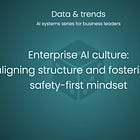📨 Weekly digest: 42 2024 | The Faustian bargain of AI: trading privacy for convenience
We readily feed LLMs our most intimate data – our hopes, fears, medical histories, even our deepest desires | AI this week in the news; use cases; tools for the techies

👋🏻 Hello legends, and welcome to the weekly digest, week 42 of 2024.
We are in the midst of an unprecedented exchange.
We readily offer our most intimate data—our hopes, anxieties, medical histories, and even our deepest desires—to LLMs.
This raw, personal information fuels their intelligence, enabling them to generate insightful text, translate languages, and write code.
But this seemingly benign exchange comes at a steep cost.
By relinquishing our data, we become incredibly vulnerable. Every query and interaction leaves a digital trail that can be exploited, potentially revealing our secrets, predicting our behaviors, and manipulating our choices.
Consider the implications of this data exposure:
Our medical records could be used to discriminate against us in insurance or employment.
Our personal beliefs could be weaponized against us in political campaigns or social interactions.
Our financial data could be exploited in phishing scams or identity theft. The potential for harm is immense, yet we seem willing to accept it as the price of progress.
Are we, in our relentless pursuit of convenience and efficiency, becoming addicted to the allure of AI, willingly sacrificing our fundamental right to privacy?
Or can we find a way to harness the power of LLMs without surrendering the very essence of our individuality?
This is the critical question facing us today, which demands careful consideration and decisive action.
We must recognize that privacy is not merely an abstract concept but a fundamental human right. Our autonomy, dignity, and ability to form meaningful relationships are essential.
We cannot allow the pursuit of technological advancement to erode this essential right. We must develop robust safeguards to protect our data and ensure that LLMs are used responsibly. This includes measures such as:
Data minimization: LLMs should only collect and retain the data necessary for their intended purpose.
Anonymization and pseudonymization: Data should be processed in a way that makes it difficult to identify individuals.
Consent and transparency: Users should be given explicit and informed consent before their data is collected and used.
Data breaches and security: Organizations that handle personal data must have robust security measures to prevent breaches.
Accountability and redress: Mechanisms should exist for individuals to hold organizations accountable for data misuse and seek redress for any harm caused.
By taking these steps, we can ensure that AI's benefits are realized while protecting our fundamental right to privacy.
Perhaps true privacy in the age of AI is a myth.
We must accept a certain level of data exploitation as the price of progress. The focus should shift to demanding transparency and control over how our data is used rather than clinging to an outdated notion of absolute privacy.
What do you think?
I am looking forward to reading your thoughts in a comment.
Happy days,
Yael et al.
This week’s Wild Pod episode
This week’s Wild Chat
🦾 AI elsewhere on the interweb
How much carbon do LLMs use? Much less than some people have claimed, and it matters how, where, and when you train them [LINK]
Walmart on ‘Adaptive Retail’ and its AI plans [LINK]
OpenAI released a report on ‘bad actors’ trying to use its products to generate spam/misinformation [LINK]
Fast access to our weekly posts
https://wildintelligence.substack.com/p/ais-gamble-will-insurers-win-or-fold
Previous digest
📨 Weekly digest
Thank you for being a subscriber and for your ongoing support.
If you haven’t already, consider becoming a paying subscriber and joining our growing community.
To support this work for free, consider “liking” this post by tapping the heart icon, sharing it on social media, and/or forwarding it to a friend.
Every little bit helps!








